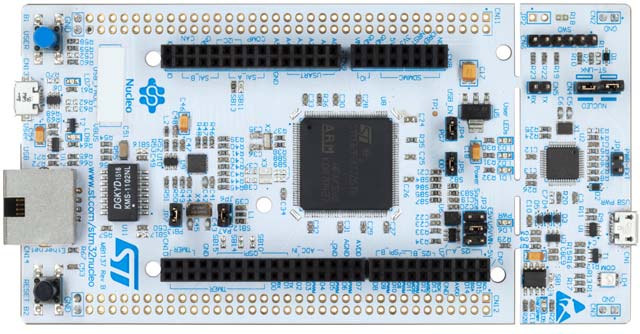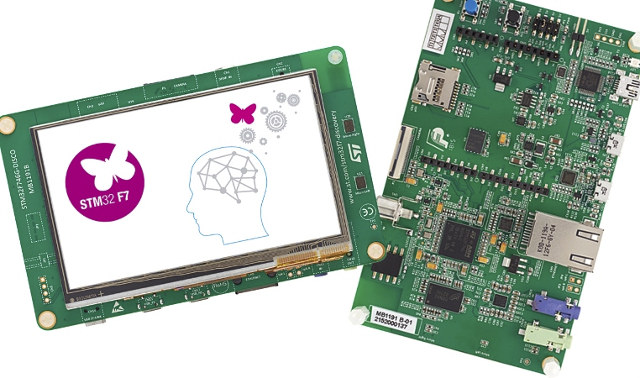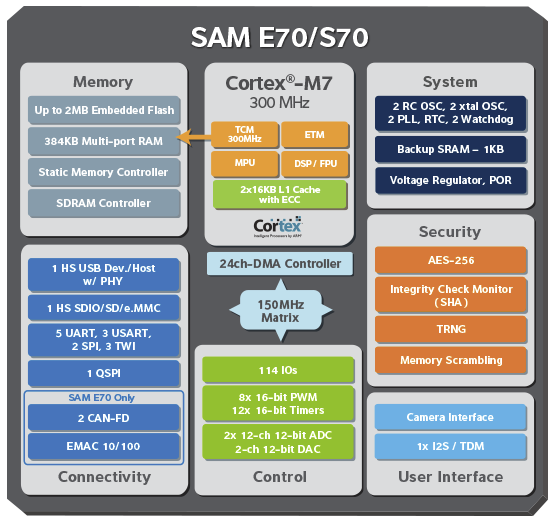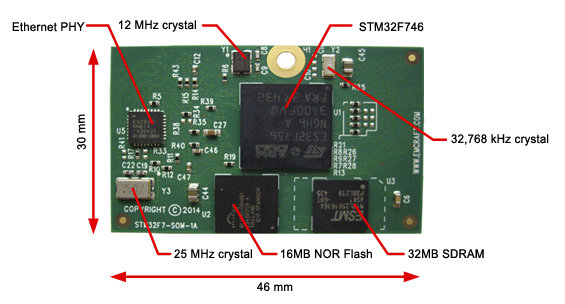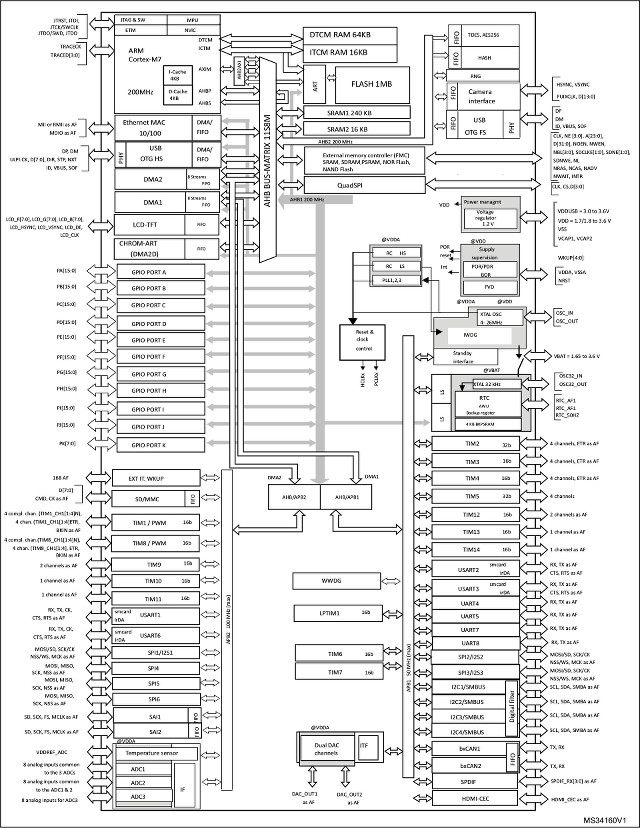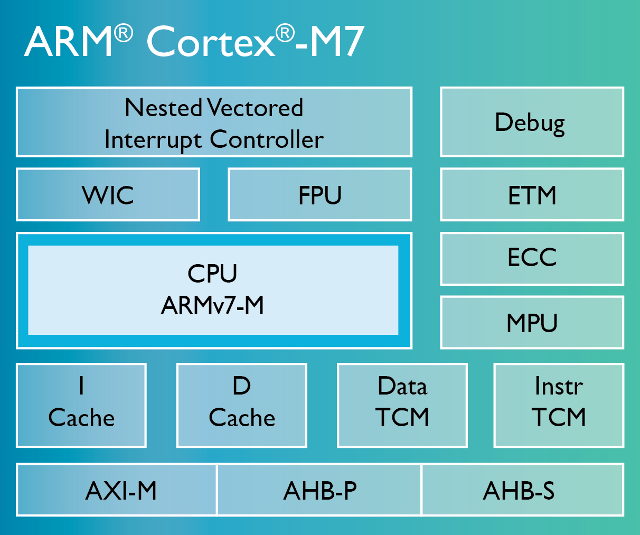STMicroelectronics introduiced its STM32F7 ARM Cortex M7 micro-controller family in 2014, and they released a $49 STM32F746G discovery board later in 2015. The company has now launched two new low cost development boards with the $23 STM32 Nucleo-144 board based on STM32F767 MCU, and a $79 Discovery Kit powered by STM32F746 MCU with TFT-LCD and MIPI-DSI support. STM32 Nucleo-144 development board Key feature of NUCLEO-F767ZI board: MCU – STMicro STM32F767ZI ARM Cortex M7 microcontroller @ 216 MHz with FPU, DSP, MMU, 2MB flash, 512 KB SRAM, 16 KB instruction TCM RAM (for critical real-time routines), and 4 KB backup SRAM Connectivity – IEEE-802.3-2002 compliant Ethernet connector USB – 1x micro USB OTG or full speed device Extension: ST Zio connector including support for Arduino UNO v3 connectivity, and additional signals (A6 to A8, D16 to D72) ST morpho extension pin header footprints for full access to all STM32 I/Os On-board […]
STM32F746G-DISCO is a $49 Cortex-M7 Board with a 4.3″ LCD Display, Arduino Headers
We’ve already seen Atmel started shipping its SAM V71 Xplained Board based on its latest Cortex M7 a few days ago, but Atmel is not the company which recently introduced a Cortex M7 development kit, as ST Micro also launched an STM32F7 Cortex M7 development kit with Arduino headers and 4.3″ LCD at the end of June. The “Discovery Kit with STM32F746NG MCU” (STM32F746G-DISCO) comes with the following specifications: MCU – STMicro STM32F746NGH6 Cortex M7 MCU with 1 MB Flash, 340 KB RAM, in BGA216 package Memory – 128-Mbit (16 MB) SDRAM (64 Mbits accessible) Storage – 16 MB Quad-SPI Flash memory, and micro SD slot Display – 4.3″ 480×272 color LCD-TFT with capacitive touch screen Camera – Camera connector Connectivity – Ethernet connector compliant with IEEE-802.3-2002 USB USB OTG HS with Micro-AB connectors, USB OTG FS with Micro-AB connectors USB functions: virtual COM port, mass storage, debug port Audio […]
Atmel SAM S70 and SAM E70 Cortex M7 MCUs, SAM V71 Xplained Board Are Now Shipping
ARM Introduced Cortex M7 IP in September, and ST Micro simultaneously announced its STM32F7 Cortex M7 MCU clocked up to 200 MHz, and boards are now available, including some running Linux. But two other companies have licenses Cortex M7, Freescale with its Kinetis KV5x micro-controllers which are yet to be mass-produced, and Atmel which has recently announced their SAM S70 and E70 micro-controllers are now in mass production. SAM E70 and S70 have similar features, but E70 offers some extra interface like CAN and Fast Ethernet: ARM Cortex-M7 core running at up to 300MHz (1500 CoreMark) Up to 2MB Flash and 384kByte SRAM Floating point unit (FPU) for high-precision computing and accelerated data processing High-performance internal memory architecture with user configurable Tightly Couples Memories and System memory, and 16kB I and D-cache High Speed USB Host and Device with on-chip high-speed PHY CMOS image sensor interface AES hardware encryption engines, […]
Emcraft Systems STM32F7 ARM Cortex M7 SoM and Development Kit Run uClinux
STMicro announced their STM32F7 MCU family the same as ARM announced their latest ARM Cortex M7 core for high-end micro-controllers last September. Emcraft Systems have now launched a STM32F7 system-on-module with 32MB SDRAM and 16MB NOR flash, and ported uClinux to the platform. The company has also launched a STM32F7 starter kit for evaluation and development. Both target industrial automation, system and power management, wireless networking / sensors and other embedded applications. STM32F7-SOM-1A Module STM32F7 system-on-module specifications: MCU – STMicro STM32F746 Cortex M7 MCU up to 200 MHz with 320KB RAM, 1MB flash in TFBGA-216 package System Memory – 32MB SDRAM Storage – 16MB NOR flash Connectivity – 802.3 Ethernet PHY SoM connectors – 2x 80-pin (0.4mm pitch) Debugging – ARM SWJ-DP combined JTAG and serial wire debug port Misc – Watchdog, RTC, USB and other I/Os via SoM connectors Power – 3.3V DC; Low-power mode with short startup times; […]
STMicro STM32F4 (Cortex M4) vs STM32F7 (Cortex M7) Graphics Demo
STMicro announced their latest STM32F7 micro-controller family based on ARM Cortex M7 last week. As ARM Techcon 2014 is now taking place, the company has uploaded an infomercial on their YouTube account, where STMicro and ARM representatives are interviewed about the new family, and talk about its performance, power consumption, target applications, business prospects, and so on. But there’s also an a short demo with two development kits one with a STM32F4 cortex M4 micro-controller, and the other with a STM32F7 micro-controllers. Since both MCU families are pin-to-pin compatible, the hardware is identical except for the MCU. Both kits are pre-loaded with a 3D graphics demo (ray tracer), and the board with STM32F7 completes the demo in about half the time of the one with STM32F439, allegedly with about the same power consumption (7 coremarks / mW). The video is about 8 minutes long, and the demo starts at 1:25. […]
STMicro STM32F7 Series is the First ARM Cortex-M7 MCU Family
Right after ARM’s Cortex-M7 announcement, STMicro has listed STM32F7 MCU family based on the latest ARM core on their website. The family is comprised of 20 different MCUs with various flash size, packages, and with or without a crypto/hash coprocessor. The company expects their STM32F756xx microcontrollers to be used for motor drive and application control, medical equipment, industrial applications such as PLC, inverters, and circuit breakers, printers & scanners, alarm systems, video intercom, HVAC, home audio appliances, mobile applications, Internet of Things application, and wearable devices such as smartwatches. STM32F7 MCUs share the following key features: Cortex-M7 core @ 200 Mhz (1000 CoreMark/428 DMIPS) with L1 cache (4KB I-cache, 4KB d-cache) 320KBytes of SRAM with scattered architecture: 240 Kbytes of universal data memory a 16 Kbytes partition for sharing data over the bus matrix 64 Kbytes of Tightly-Coupled Data Memory (DTCM) for time critical data handling (stack, heap…) 16 Kbytes […]
ARM Introduces Cortex-M7 MCU Core for IoT, Wearables, Industrial and Automotive Applications
ARM has just announced Cortex-M7 processor based on ARMv7-M architecture, with double the compute and digital signal processing (DSP) capability of ARM Cortex M4. The latest ARM MCU core targets IoT and wearables applications for the automotive, industrial, and consumer markets including motor control, industrial / home / factory automation, advanced audio, image processing, connected vehicle applications, and so on. Cortex-M7 comes with enhanced DSP instructions, a better FPU (FPv5 with single and double precision support), and tight coupled memory compared to Cortex-M4, according to an Anandtech article. ARM Cortex-M7 also achieves 5 CoreMark/MHz against 3.41 CoreMark/MHz for Cortex M4, and up to 3.23 DMIPS/MHz against up to 1.95 DMIPS/MHz. ARM Cortex-M7 features listed in the press release: Six stage, superscalar pipeline delivering 2000 Coremarks at 400MHz in a 40LP process. AXI interconnect (supports 64-bit transfer) and fully integrated optional caches for instruction and data allowing efficient access to large […]


